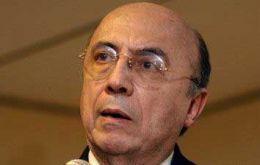MercoPress. South Atlantic News Agency
Economy
-
Thursday, December 11th 2008 - 20:00 UTC
German economy forecasted to contract 2.2% next year

Germany's Munich based Ifo (Institute for Economic Research) expects the German economy to contract 2.2% in 2009 and continue falling into the following year, according to a forecast published on Thursday.
-
Thursday, December 11th 2008 - 20:00 UTC
Argentine Lower House approves tax moratorium

The Lower House of Argentina approved early Thursday a controversial bill that would establish a moratorium on unpaid taxes and give tax opportunities to Argentines who repatriate money and assets held overseas.
-
Thursday, December 11th 2008 - 20:00 UTC
LAN reported traffic increase of 9.9% during November

LAN Chile and related companies, one of the leading airline groups in Latin America reported a passenger traffic increase of 9.9% in November, according to preliminary monthly traffic statistics and punctuality indicators.
-
Thursday, December 11th 2008 - 20:00 UTC
Brazil launches tax-cut and credit stimulus plan

Brazil's government will cut taxes by 8.4 billion Real (approximately 3.6 billion USD) to prop the slowing economy and meet a 4% growth target in 2009 next year, Finance Minister Guido Mantega and Central Bank president Henrique Meirelles announced Thursday in Brasilia.
-
Thursday, December 11th 2008 - 20:00 UTC
Brazil demands leadership from Obama on trade

Brazil said on Thursday that global trade talks need a strong signal from US President-elect Barack Obama to save them from failure. Brazilian Minister Celso Amorim made the announcement after meeting with World Trade Organization Director General Pascal Lamy in Geneva.
-
Thursday, December 11th 2008 - 20:00 UTC
Bribes and business: Russia and China set the pace

Companies from emerging economies such as Russia and China are more likely to pay bribes when doing business in other countries, a survey claims.
-
Thursday, December 11th 2008 - 20:00 UTC
Rio Tinto slashing drastically jobs and capital spending

The world's third-largest mining firm Rio Tinto is eliminating 14.000 jobs and cutting investment drastically as part of plans to reduce debt by 10 billion USD by the end of next year.
-
Wednesday, December 10th 2008 - 20:00 UTC
Record low for UK £ vs the Euro as recession advances

The British pound has hit a record low against the Euro amid more economic gloom for the United Kingdom. At its low point one pound bought just under Euros 1.14, its weakest-ever showing against the single currency.
-
Wednesday, December 10th 2008 - 20:00 UTC
Chinese exports drop 2.2% in November and imports 19.1%
China has reported a fall in exports for the first time in seven years as a result of the global economic downturn. Exports declined in November from the same period a year ago for the first time since June 2001, data show.
-
Wednesday, December 10th 2008 - 20:00 UTC
IMF report exposed Spain's long term vulnerability

Spain could become stalled in protracted weak growth and high unemployment unless it undertakes reforms to raise productivity and cut costs, the International Monetary Fund said in a report published on Wednesday.
